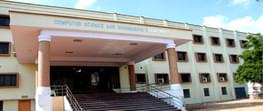Dr. Dattatri K. Nagesha is a Scientist, Academician, and Entrepreneur in the field of Nanoscience and Nanotechnology. He is the School of Sciences at GITAM Hyderabad.He has rich experience and a demonstrated history of working in higher educational institutes, hospitals, and research.
Dr. Nagesha has a strong educational background and is professionally skilled and trained in the areas of Materials Science, Nanomaterials, Optical Spectroscopy, Electron Microscopy, and Nanotechnology. He acquired his PhD from Oklahoma State University, US, and completed his master's in M.Sc. from the Indian Institute of Technology, Madras. He also worked as a Senior Research Scientist at Northeastern University in Boston.

You held key positions at various prestigious institutions throughout your career. What is that one thing that made you excited and walk with GITAM in the journey?
I've been fortunate enough to work with a couple of other top institutions in the past. What attracted me to GITAM is that they have a vision of being in the global 100 universities by the year 2040. That's a very ambitious plan for a private institution. This excited me, and I wanted to contribute to it. We have recently introduced liberal education programs in Science, Humanities, Social Sciences, and Business. Why is this important? The reason it's important is that knowledge nowadays is not limited to one domain, it is interdisciplinary in nature. This is also in line with NEP 2020, where the education policy expects students to have holistic and broader learning. GITAM is really taking a step towards this by designing this major and minor course combination.
What motivated you to pursue a career in the Science domain and become the principal for GITAM School of Science?
I was always passionate about Science. After my 12th grade, I had a chance of either joining the medical profession or general Science. I was not very inclined towards engineering, so my choice was medicine. I decided to study Science and started with a B.Sc. in chemistry. After that, I completed my M.Sc. in chemistry at IIT Madras. This changed my perspective, and I went to the USA for my higher studies. I worked in an exciting field called nanotechnology, which was just starting in the early 2000s. I wanted to be a faculty researcher, but somewhere along the line, I shifted from being a researcher to an Administrator. I was able to bring my experience as a researcher into the administrator role. That is where I became the principal of the GITAM School of Science.
As you being an entrepreneur by your own, How do you support and mentor students in their entrepreneurial pursuits with the fusion of Science into it?
Entrepreneurship is close to my heart. I started out as a typical academician and worked at a university, but the entrepreneurship bug was still there in me, saying, “You should do it, you should do it”. In 2019, I took the plunge and established my own startup, but COVID brought a lot of challenges. I learned a lot through my venture.
To my students, I teach my experience and how to survive in the field. I share my failures, my journey, and the pitfalls and challenges that I faced. What I make them realise is that Science is an equally important part of all industries. If you have a good product with Science backing it, the chances of success are higher. Additionally, GITAM has a mandatory course called VDC - Venture Development Course to support students’ entrepreneurial spirit. We have also tied up with Northeastern University, Boston to deliver this course.
How do you stay current with the latest trends and developments in the field of Sciences and incorporate them into the curriculum and programs offered by GITAM?
Science is constantly growing, and there are constant developments being made through research. This is something all of my teachers and I actively contribute to. We are in touch with the latest journals, and publications to stay in touch with our fields. For instance, right now in Science, especially in mathematics, everyone is talking about machine learning and data Science. Even though it's associated with computers, what we forget is that there's a fundamental Science behind it. When we do curriculum revisions, whatever research we study, learn, and practice, we try to incorporate it. Some of them might be too early for an undergrad-level course, but we try to incorporate them in the form of projects. For M.Sc. projects, our curriculum keeps getting updated, and we are aligning ourselves with the latest things that are happening in research.
Check GITAM Hyderabad Courses and Fees
How well is GITAM focusing on maintaining industry relationships with companies in order to leverage them for live projects, training, and placements for the students?
In the past year and a half, GITAM has made a strategic decision to focus more on research. We have had an investment of INR 30 crore that the university has made in equipping our researchers with the latest equipment needed for research. We are heavily invested in procuring a lot of instruments that are needed to carry out research.
From the present academic year onward, undergrad students, as part of their curriculum in the liberal education program in Science, Humanities and Management, have to complete a summer internship.
We are also starting an undergrad program of four years as per NEP's suggestions. There will be three years of rigorous academic work, and the fourth year is earmarked for research. Once they have hands-on experience, they can comfortably work in the industry. They will be much better equipped to handle any projects or assignments.
How well is GITAM focusing on maintaining industry relationships with companies in order to leverage them for live projects, training, and placements for the students?
GITAM has an office called the GITAM Career Guidance Cell or GCGC, that functions as a training and placement cell. The office provides students with the necessary help to pursue their chosen career path. Some students choose to work, others opt for higher studies, and somebody becomes an entrepreneur. We help and provide support to all of these students.
The students need to be trained in certain aspects to get a job that the GCGC provides. They interact with companies to find out what the actual need is. Once we figure out that part and if it's something that needs to go into the curriculum, we go back and revise our curriculum. We aim to get these skills incorporated into the student while they are in the classroom rather than providing a separate training session.
Check GITAM Hyderabad Placement
Can you share examples of successful collaborations or partnerships between the School of Science and external organizations, such as industry, government, or research institutes?
Within the GITAM organisation, the School of Science contributes a lot to research. Individual faculties at our college have also been exploring research, and some have also received funding from government organisations. A few teachers have gotten aid from private industry in the form of collaborations or consultancy projects.
In the past five years, the School of Science has been upgraded and attracted about five crores worth of funding from various funding agencies. These are all cutting-edge ideas that have relevance directly to the government or to the industry. The partnership that we've built through the research is multi-fold, we do partnerships or research collaboration. And this also leads to faculty getting the opportunity to go to industry to learn the latest trends, but it also helps students get project work, internships, or jobs. It's a cycle that we work in where students get to go to industry, and from industry, they get projects, and from the projects, they learn new things.
Can you throw some light on what are the emerging trends in the Science education field? And what is the scope for those in the future?
In our country, the emphasis for students right after their 12th grade has always been either medicine or engineering, but this trend is slowly changing for a variety of reasons, like saturation. We are seeing a lot of interest in Science, the reason being that students are realising and parents have also realised that behind any technology, there's fundamental Science. It's not as great as it should be or where we think it should be, but we have a direction. Even though the trend shows a lot of students are going for engineering, especially computer Science, I think that will slowly change and we'll start seeing students interested in Science.
Within Science, there is pure Science like Chemistry, Mathematics, Physics, and application-based Sciences. For instance, here on the Hyderabad campus, we provide food Science and technology. This is a very exciting area of interest among students, and the future is bright.
What kind of steps GITAM is taking in order to bridge the gap between academia and the real industry world?
The purpose of education for students is to get knowledge and use that knowledge to get a job. If a student is interested in getting a job in the industry, they should be knowledgeable about what the industry requires. It is very important that when we design our curriculum for every program, whether it be Chemistry, Physics, or Statistics, we provide industry requirements.
Along with our faculty, we invite industry experts and professionals to help us with the framing of the syllabus. For all of our course syllabuses, we have a member of the industry tell us what we are doing in the curriculum. By the time the student finishes his graduation at the end of three years, there's a very good chance that the syllabus might get outdated. For this reason, we provide refresher courses and crash courses. These programs are ready are designed in such a way the student is prepared to face the industry in a short period of time. We also have internships that are done during the second and third years.










![IIT Hyderabad - Indian Institute of Technology - [IITH]](https://image-static.collegedunia.com/public/college_data/images/appImage/1485941210cvr1.png?h=111.44&w=263&mode=stretch)

![International Institute of Information Technology - [IIIT]](https://image-static.collegedunia.com/public/college_data/images/appImage/25357_00.jpg?h=111.44&w=263&mode=stretch)

![Birla Institute of Technology and Science - [BITS]](https://image-static.collegedunia.com/public/college_data/images/appImage/28467_BITSH_New.png?h=111.44&w=263&mode=stretch)



![ICFAI Foundation for Higher Education - [IFHE]](https://image-static.collegedunia.com/public/college_data/images/appImage/150408804525355IFHENew.jpg?h=111.44&w=263&mode=stretch)

![University College of Engineering, Osmania University - [UCE]](https://image-static.collegedunia.com/public/college_data/images/appImage/24550_UCE_New.jpg?h=111.44&w=263&mode=stretch)
.png?h=42.55&w=42.98&mode=stretch)












![GITAM School of Architecture - [GSA]](https://image-static.collegedunia.com/public/college_data/images/logos/1741581880GITAMLOGO.png?h=72&w=72&mode=stretch)
![GITAM Dental College & Hospital -[GDCH]](https://image-static.collegedunia.com/public/college_data/images/logos/1761905534dentallogo.webp?h=72&w=72&mode=stretch)






![Gitam Institute of Medical Science & Research - [GIMSR]](https://image-static.collegedunia.com/public/college_data/images/logos/1732968602gimsrlogo.jpg?h=72&w=72&mode=stretch)




.png?h=72&w=72&mode=stretch)



.png?h=72&w=72&mode=stretch)



.png?h=72&w=72&mode=stretch)



![GITAM School of Architecture - [GSA]](https://image-static.collegedunia.com/public/college_data/images/logos/17447161271743855508gitamLogonew11.png?h=72&w=72&mode=stretch)



![Jawaharlal Nehru Technological University - [JNTUH]](https://image-static.collegedunia.com/public/college_data/images/logos/1687173996JNTUH.jpg?h=72&w=72&mode=stretch)
![Vallurupalli Nageswara Rao Vignana Jyothi Institute of Engineering and Technology - [VNR VJIET]](https://image-static.collegedunia.com/public/college_data/images/logos/1747990162VNRVJIETlogofiles01.png?h=72&w=72&mode=stretch)

![K L University - [KLH]](https://image-static.collegedunia.com/public/college_data/images/logos/1619089090Logo.png?h=72&w=72&mode=stretch)
![BV Raju Institute of Technology - [BVRIT]](https://image-static.collegedunia.com/public/college_data/images/logos/1716524522bvritlogo.png?h=72&w=72&mode=stretch)
![Malla Reddy University - [MRU]](https://image-static.collegedunia.com/public/college_data/images/logos/1611807708MallaReddyUniversityremovebgpreview.png?h=72&w=72&mode=stretch)
![CMR Engineering College - [CMREC]](https://image-static.collegedunia.com/public/college_data/images/logos/1593438888Logo.jpg?h=72&w=72&mode=stretch)
![Malla Reddy Engineering College - [MREC]](https://image-static.collegedunia.com/public/college_data/images/logos/1762686474MRDU.png?h=72&w=72&mode=stretch)
![Gokaraju Rangaraju Institute of Engineering and Technology - [GRIET]](https://image-static.collegedunia.com/public/college_data/images/logos/1481803864col28052.jpg?h=72&w=72&mode=stretch)
![Mahatma Gandhi Institute of Technology - [MGIT]](https://image-static.collegedunia.com/public/college_data/images/logos/1659754149logo2.png?h=72&w=72&mode=stretch)
![Vardhaman College of Engineering - [VCE]](https://image-static.collegedunia.com/public/college_data/images/logos/1642160809logo.png?h=72&w=72&mode=stretch)
![ICFAI Foundation for Higher Education - [IFHE]](https://image-static.collegedunia.com/public/college_data/images/logos/16135630511526386419IFHELogo.jpg?h=72&w=72&mode=stretch)
![Sreenidhi Institute of Science and Technology - [SNIST]](https://image-static.collegedunia.com/public/college_data/images/logos/1652251888logo8080jpg01.jpg?h=72&w=72&mode=stretch)
![Chaitanya Bharathi Institute of Technology - [CBIT]](https://image-static.collegedunia.com/public/college_data/images/logos/16444740444304786122432129690538407436664709710872576n.jpg?h=72&w=72&mode=stretch)


Comments